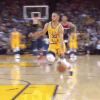EvanZ wrote:My answer to this, honestly, is so? How am I supposed to interpret this unless you place it in the context of other players at his position?
Maybe you also need to interpret it in the context of his team?
Honestly, I can't say much when your only response is "so"? That's not a particularly insightful response.
Also, whether this matters is only relevant to its effects on winning...so, what do these stats tell us in terms of wins?
That's the thing: if he's on a team with one or more perimeter players who bear a lot of possessions and are efficient with them, then he's probably producing wins. On a team without anybody on the perimeter who can stop anybody - like Toronto - then it's scary when he's your best perimeter defender, right? If there were one or more other good defenders on the perimeter, suddenly the fact that he's not a stop-producer becomes far less important.
Without the context of winning, it's interesting, but hard to know what to do with it. RAPM, while it's a black box and doesn't tell you why one player is better than another, at least, tells you how one player impacts the bottom line (winning) compared to other players. It's about winning in the end, isn't it?
It is about winning, that's the important thing. But at some level, winning does happen within a team context and I don't trust any single one metric to correlate individual performance to winning. When that tries to get done from an indirect standpoint, I'm even less confident in allowing it to tell the
whole story (which it seems you're trying to do - to the point of insisting that what we can count ought to be set aside based on RAPM's output). I am not likely to follow that yellow brick road, personally. I'm certainly interested in looking at it when I don't have direct data - and maybe even when I do. But I certainly won't base my thinking entirely upon it.
You do raise an excellent point about the "black box". Oliver's metrics were designed, ultimately, to be tools to be used for coaches (he himself was an assistant coach in the NCAA); that's important to me, as a coach who's trying to understand and interpret and utilize metrics. PDSS data is immediately applicable and transparent for how I'm trying to understand my own teams and personnel, and deploy them accordingly.




